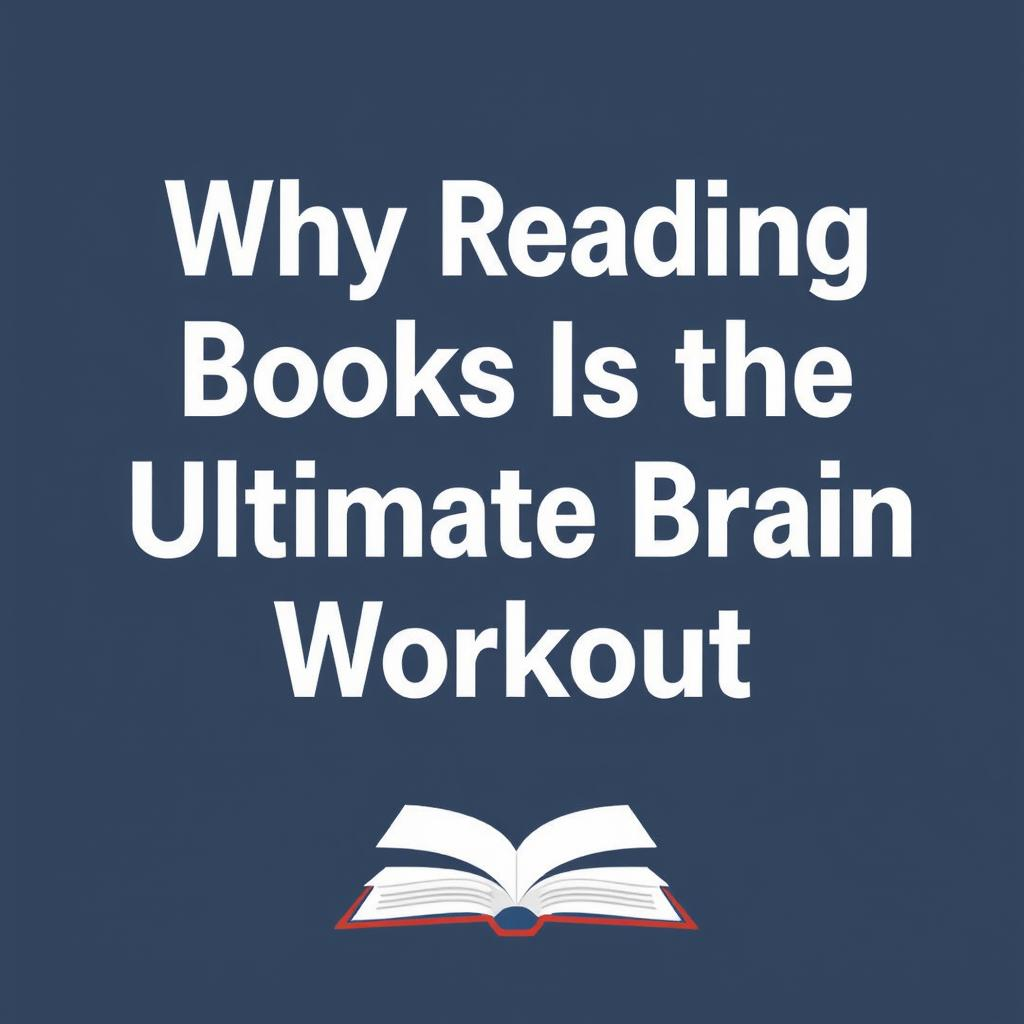
Why Reading Books Is the Ultimate Brain Workout
When you think of a workout, what comes to mind? Maybe it’s lifting weights, running on a treadmill, or stretching out on a yoga mat. But what if we told you that one of the most effective workouts you can give yourself doesn’t involve breaking a sweat—it involves picking up a book?
Reading isn’t just a way to pass time or escape into a different world. It’s a full-on mental exercise that stimulates your brain in ways few other activities can. In fact, reading regularly can improve memory, focus, emotional intelligence, and even protect your brain from aging.
Let’s break down exactly why reading books is the ultimate brain workout—and why you should make it part of your daily routine.
1. Reading Strengthens Neural Connections
Every time you read, your brain forms new connections between neurons—those tiny cells responsible for transmitting information. This process, known as neuroplasticity, allows your brain to adapt, learn, and improve over time.
Just like lifting weights builds muscle, reading strengthens the brain’s ability to process and retain information. The more you read, the more flexible and responsive your brain becomes.
2. It Enhances Memory and Recall
When you read a book, you’re keeping track of plots, characters, timelines, themes, and settings. Your brain works like a mental filing system—organizing and storing all that information. Doing this regularly helps improve your memory and your ability to recall details over time.
Reading also engages the hippocampus, the part of the brain responsible for learning and memory. It’s like doing mental reps every time you flip a page.
3. Reading Improves Focus and Concentration
In the digital age, our attention spans have taken a hit. We’re constantly multitasking—switching between apps, notifications, emails, and videos. Reading is the perfect antidote.
When you sit down with a book, your brain shifts into a single-tasking mode. You stay focused on one thing for an extended period of time. This deep focus strengthens your ability to concentrate, which spills over into other parts of your life—like work, study, or creative projects.
4. It Builds Vocabulary and Language Skills
Reading regularly exposes you to new words, phrases, idioms, and sentence structures. Without even realizing it, you’re expanding your vocabulary and sharpening your communication skills.
This mental growth doesn’t just make you sound smarter—it helps you write better, speak more clearly, and understand others more effectively. It’s a linguistic workout that keeps your verbal muscles toned.
5. Reading Enhances Emotional Intelligence
Books—especially fiction—allow you to step into someone else’s world. You experience their thoughts, struggles, and triumphs. This perspective-taking boosts your empathy, a key part of emotional intelligence.
Understanding how others think and feel enhances your social skills, relationships, and even decision-making. Reading trains your brain to be more compassionate, observant, and emotionally aware.
6. It Reduces Stress and Promotes Mental Clarity
When you read, your mind settles. Your breathing slows. Your heart rate drops. Just six minutes of reading can reduce stress levels by up to 68%, according to a study by the University of Sussex.
Reading is a mental reset. It helps you break away from anxious thoughts, overthinking, and digital overload. The brain responds to this as a form of meditation—bringing calm, clarity, and balance.
7. Books Trigger Your Imagination
Reading isn’t passive. Your brain is actively constructing images, voices, and scenes in your mind. It’s like a mental cinema that plays only for you.
This constant creation strengthens your imagination and visualization skills—tools that are critical for problem-solving, creativity, and innovation. The more you read, the more your brain learns to think outside the box.
8. It Stimulates Analytical and Critical Thinking
Whether it’s following a mystery novel, interpreting symbolism in a literary piece, or questioning the argument in a non-fiction book, reading pushes you to think critically.
You learn to evaluate information, spot inconsistencies, form opinions, and make predictions. This kind of analytical thinking is essential in everyday life—from solving problems to making better choices.
9. Reading Delays Cognitive Decline
Numerous studies have shown that regular readers have a lower risk of developing cognitive diseases like Alzheimer’s and dementia. The brain, like any other organ, benefits from being actively used.
Mental stimulation through reading keeps your brain healthier as you age. It’s a long-term investment in your mental fitness and independence.
10. It’s a Mental Escape That Recharges You
While reading gives your brain a serious workout, it’s also a form of rejuvenation. It allows your mind to step away from your own worries and routines and dive into different worlds, ideas, and perspectives.
This mental shift gives your brain a fresh boost of energy, inspiration, and clarity. After reading, people often feel more focused, motivated, and emotionally grounded.
Pro Tips: How to Get the Most Out of Your Reading “Workout”
Like any fitness regimen, consistency is key. Here are a few tips to level up your brain workout through books:
Make reading a daily habit – even just 10–15 minutes a day adds up.
Choose a variety of genres to challenge different areas of your brain—fiction for empathy and creativity, non-fiction for logic and learning.
Take notes or highlight to help retain and reflect on what you’re learning.
Discuss books with others to engage in deeper thinking and build connections.
Go screen-free with physical books to reduce distractions and improve focus.
Final Thoughts
In a culture obsessed with physical fitness, we often forget the most important muscle of all—the brain. Reading is one of the most powerful, accessible, and enjoyable ways to train your mind, reduce stress, and sharpen your intellect.
It’s more than just a hobby. It’s a discipline. A practice. A workout that nourishes your mental health, fuels your creativity, and boosts your personal and professional performance.
So, the next time you’re tempted to scroll through your feed, consider reaching for a book instead. Your brain will thank you—and so will your future self.
